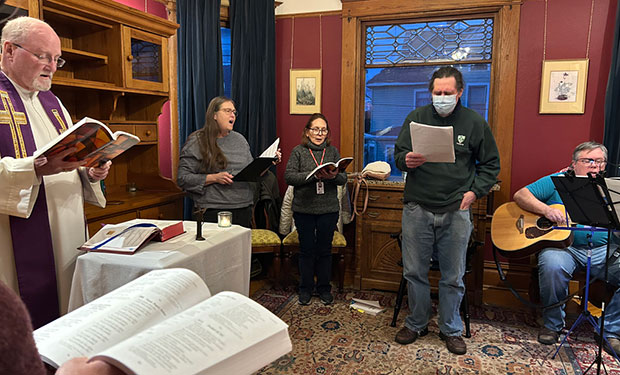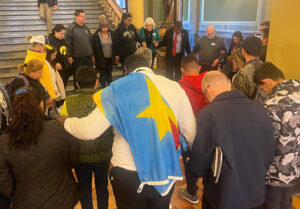
Father Ed Fitzpatrick, left, presided at Mass at the Iowa City Catholic Worker house on Johnson Street Feb. 16.
By Barb Arland-Fye
The Catholic Messenger
IOWA CITY — Tears began to form in Petra Mujica’s eyes as she, a naturalized U.S. citizen and member of St. Patrick Parish, shared her impression of proposed bills in the Iowa Legislature that target migrants without documentation.
Mujica shared her thoughts after Mass and over soup supper Feb. 16 at the Iowa City Catholic Worker house on Johnson Street, where concerned Catholics and others gathered to learn more about the legislation and how they might respond to it.
“This touches me as an immigrant,” said Mujica, who has lived in the U.S. for 14 years but still has family members living in her native Venezuela. “I am a naturalized citizen and my children are citizens. I thank God I have everything set up.” She worries about laws that could tear apart families of mixed immigration status and prevent heads of households from traveling to their jobs for fear of being pulled over by police or sheriff’s deputies. “Keeping families together — we know at the Catholic Worker that they do way better when they are kept together,” said Emily Sinnwell, co-founder of the Iowa City Catholic Worker.
Punitive effects
“The proposed legislation would really impact our communities,” said Ninoska Campos of Honduras, who spoke at the soup supper. Campos was among 30 immigrant and refugee workers and four clergy members who traveled to the Iowa State Capitol Feb. 12 to share their stories and their concerns.
“I feel the (proposed) laws are ridiculous and they would affect me personally. We come to live in this country not because we want to but because we have to. We don’t come here for a handout, we come here to work,” said Campos, a leader in Escucha Mi Voz, an advocacy group. She spoke in Spanish, with Sinnwell serving as her interpreter.
Escucha Mi Voz and the Iowa City Catholic Worker organized the trip to Des Moines. While there, they prayed in a circle in the Iowa Statehouse and updated the Iowa Legislature’s International Relations Committee about the connection between international war and conflict and the Iowa economy.
Iowa Senator William Dotzler Jr., who serves on the committee, said he wanted to hear from constituents about how legislation affects their lives, diocesan Social Action Director Deacon Kent Ferris later told The Messenger. He traveled to Des Moines with the group because “Escucha Mi Voz is a Catholic Campaign for Human Development-funded group and their aim is to enable immigrants to be heard. I was there in solidarity with them.”
The group also advocated against proposed bills that would criminalize transportation of undocumented persons, restrict their access to college education, allow Iowa law enforcement officers to act as federal immigration agents and require Iowa businesses to use E-Verify, duplicating federal law.
Clinton Dimambu, an immigrant from the Democratic Republic of Congo, said the proposed legislation affects migrants from many different countries, including him. “I used to drive asylum seekers to their appointments in Cedar Rapids,” said Dimambu, who has lived in the U.S. for nine years and works with Escucha Mi Voz.

Immigrant and refugee workers from Escucha Mi Voz and Iowa City Catholic Worker and four clergy members from the Diocese of Davenport prayed in a circle in the Iowa Statehouse in Des Moines Feb. 12.
A call to action
Prayer is essential to their advocacy efforts. “We are nothing without the strength of God,” Campos said. The proposed legislation “goes against Church teaching on welcoming the stranger,” said David Goodner, co-founder of Iowa City Catholic Worker (ICCW) and co-director of Escucha Mi Voz (EMV). The “anti-immigrant bills, opposed by the Iowa Catholic Conference, are all moving forward but there’s still time to take Catholic action for a preferential option for the poor,” he said.
Each of the bills would have a chilling effect on immigrants and refugees, Goodner believes. The bill allowing Iowa law enforcement officers to act as federal immigration agents could lead to profiling of individuals and lead to a “Wild West” enforcement mentality, he said.
Goodner explained the legislative process to the gathering, guiding them through the steps of how a bill becomes law and critical moments along the way that make or break a proposed bill. All of the proposed immigration bills made it through the first “funnel.” The next funnel is March 15. The Iowa Legislature adjourns approximately in mid-April.
He also provided a call to action:
- Inform friends, family, clergy, parishioners and co-workers about the immigration bills (see breakout of bills and descriptions).
- Ask people to contact their state representatives and senators and to participate in a future bus trip to Des Moines in solidarity with immigrants.
- Sponsor a bus seat for an immigrant worker who can’t afford the ticket.
- Contact Iowa House Speaker Pat Grassley (pat.grassley@legis.iowa.gov) and Senate Majority Leader Jack Whitver (jack.whitver@legis.iowa.gov) regarding the bills.
- Ask your pastor to ride the bus and to sponsor an immigrant’s ride.
- Talk to your committees and groups about the issue and sign them up to take action.
The proposed immigration bills
HF 2608: This bill would limit access to certain benefits available to eligible immigrants and would charge anyone transporting an undocumented person with a Class C felony. “The Church does not encourage illegal immigration but is concerned the bill as drafted could be interpreted by some to criminalize basic charity to immigrants,” Iowa Catholic Conference (ICC) Executive Director Tom Chapman said.
HF 2320: This bill would require proof of citizenship to access in-state tuition at a public university or community college. David Goodner of the Iowa Catholic Worker said this bill would discourage students from advancing their education and future careers.
SF 2340/HF2567: This bill would allow Iowa law enforcement officers to act as federal immigration agents.
SF 108: This bill would require Iowa businesses to use E-Verify. “It’s the ICC’s opinion that this bill is duplicative in part because the federal government is already authorized to investigate employment violations in this context,” Chapman said.











